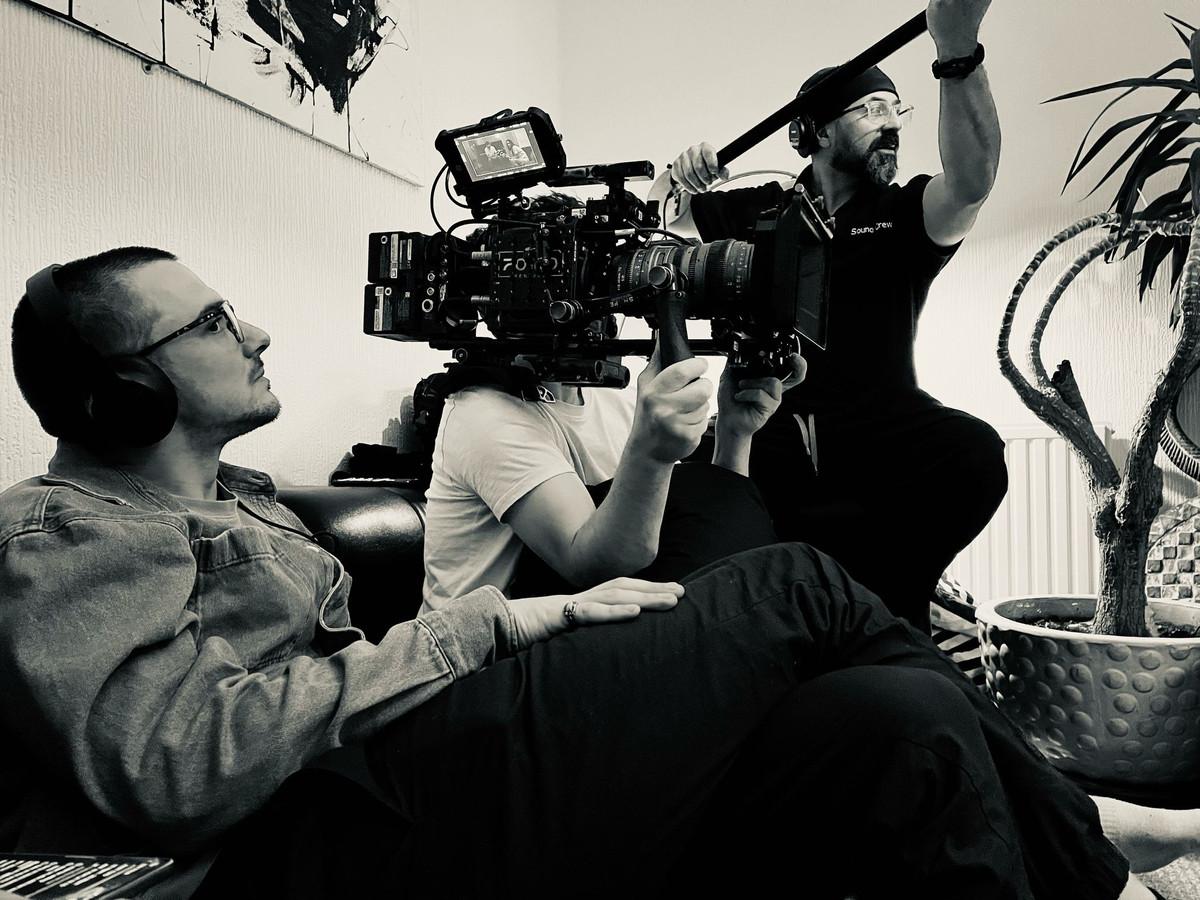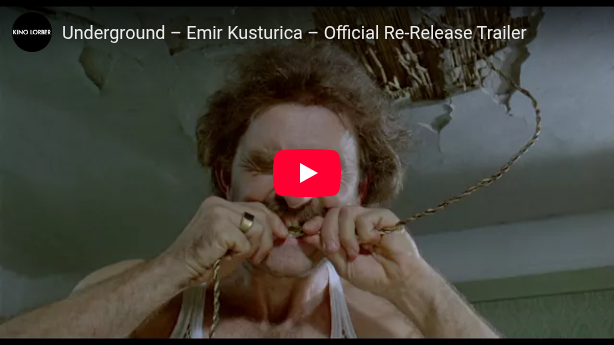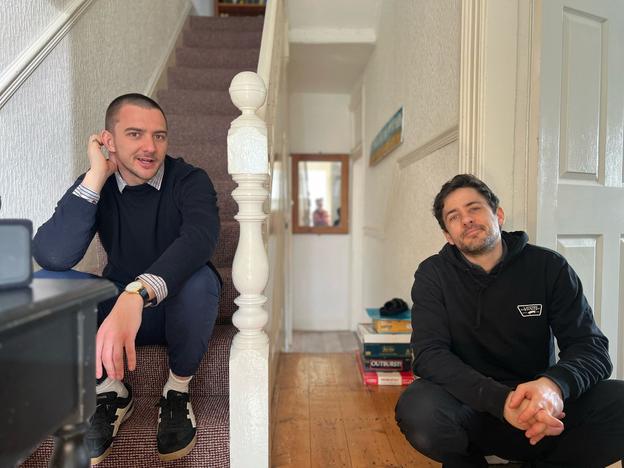Alexander “Al” Pillar, a Leeds native, has never taken the easy road. After years of teaching English in Bratislava, he recently gave it up to pursue his lifelong dream of becoming a filmmaker.
He has just completed filming on his debut feature, “Symphony of Strangers”. Although the film is set and shot in his hometown, much of the screenplay was written while he was living in Bratislava, where he remains based — for now, at least.
Al’s life has been shaped by adversity. He grew up in a fractured home, marked by disability, mental illness, and religious indoctrination. During those difficult early years, he found refuge in European cinema. With his film, he hopes to, as he puts it, “use the tropes and techniques from a mid-90s Polish film” and transplant them into a contemporary British setting.
In this interview, Al opens up about his tumultuous upbringing, the cultural idiosyncrasies of Southeast Asia, and how Slovakia measures up as a tourist destination. He also shares his hopes for future filmmaking projects — including the possibility of one set in Bratislava.
Tell me about your most recent profession and what brought you to Bratislava.
Teaching started for me because I’ve got rubbish hands — a fine motor skills impairment, a bit like carpal tunnel syndrome — so I lack dexterity. That ruled out trades or even bartending, where I was simply too slow. I also wanted to travel, but I had expensive ambitions. I needed to save while travelling, so I looked into teaching English in Asia. I almost went to South Korea, but I’m glad I didn’t. It sounds like a brutal work environment, with endless hours, similar to Japan’s salaryman culture where falling asleep at your desk is seen as a badge of honour.
Where in Asia did you end up teaching?
It was Vietnam, then Myanmar, back to Vietnam, and later Romania — mostly online there. After two years in Asia, I wanted to live in Europe again. It’s tough to integrate into Asian societies. The language is nearly impossible, and the level of English isn’t close to what you find here or in Romania. Vietnam has a huge expat community, but it’s a bubble. Even if you learn the language, the cultural gap is massive. Family-focused values there clash with our individualistic Western ways, which might even seem sickening to them. They’re almost too sincere for Brits, whose humour tends to be ironic and backhanded. Irony feels a bit lost there. They’re purer in a way. Both sides could learn from each other, but the differences hit you hard. Less so in Myanmar, though.
How’s that?
It’s a philosophical thing. Confucius isn’t big in Myanmar. His teachings, with their 72 rules on etiquette — such as how to sit or bow — shape places like China and Japan. There, it’s black and white when it comes to what’s allowed, especially when it comes to speaking out against the government. Older generations in Vietnam feared bugs in the classroom, a hangover from their communist system. In Myanmar, though, everyone’s a dissident now. People love slagging off the government, especially during that brief democratic window when they could finally vent.
What brought you from Romania to Bratislava?
I took a scattergun approach, applying for jobs in rural Vietnam, Uzbekistan, and elsewhere. I got an offer from a company here, and at the time I thought it would be cheaper living, helping me save some money. Plus, there was a girl from my past in Vienna I hoped to rekindle things with. That backfired spectacularly, but it turned out to be a blessing in disguise — a final nail in the coffin, helping me move on. I would have left Bratislava if it hadn’t been for another job that paid well enough to save towards my goals. In teaching, you always hear about the oil rigs in Saudi Arabia as a way to save big — for something like a house deposit — but I didn’t want that graveyard shift life.
How do the kids you’ve taught in Bratislava compare with those elsewhere?
It’s hard to say whether they’re better or worse. In Asia, you’re a novelty — white, playing games — so class feels like a holiday from their usual rote memorisation and ruler discipline. I had to teach them words like “imagination” and “creativity”, because their system — marching, saluting the flag, martial arts before school — doesn’t encourage that. They’d get carried away, sometimes trying silly things like poking you, which you have to shut down quickly. In Slovakia, it’s not such a stark contrast. Some English teachers here might be more fun, others duller than local ones. There, it’s all games and crowd control, which works for vocabulary. Memorisation through games is quick, but their English is weaker than that of Slovak kids, so they’re stuck on basics, not ready for projects or presentations by third or fifth grade. Here, I taught first to seventh graders, up to age 12 or 13.
What do you make of Slovakia’s school system compared with England’s or other places you’ve seen?
It’s pretty relaxed here — lots of breaks and trips, not much heavy discipline — but the kids are well-behaved. Slovaks can be pessimistic, thinking their society is backward, but it’s peaceful, especially compared with England or even Ireland. I haven’t seen kids flip police vans here like I did growing up. Once, I was near a riot van that kids had overturned, and a German Shepherd came at me. I slammed a door in its face. Part of it might be that we taught at pricier schools here, but Slovakia’s economic divide isn’t huge. It’s one of the fairest countries for wealth distribution. Even poorer kids I’ve seen in extracurriculars are well-mannered, unlike the chaos I grew up with — or caused — like the time me and three mates misappropriated a school bus.
You stole a school bus?
Not stole — misappropriated. It was meant to take us to the gym for PE. We skipped changing, hopped on, and convinced the driver I was the teacher. I was 16 — ridiculous that he believed us. We drove to the gym, persuaded them we were the only ones meant to be there, and enjoyed it ourselves while everyone else was stuck. Nothing like that happens here.
You’ve been to some diverse places. How would you rate Bratislava and Slovakia as travel destinations compared with your other experiences?
It’s not top 10, nor bottom 10 — not quite top half either. People tend to visit Slovakia as part of a regional trip around central Europe. Yorkshire, where I’m from, has roughly the same population as Slovakia — about five million. It’s a solid base, near Vienna and four hours from Prague. I don’t bother with Prague anymore — it’s lost its spark for me — but I love gigs in Budapest and Vienna. Bratislava’s up-and-coming, with a booming bar and nightlife scene, although the city centre is becoming overly gentrified. English and Spanish dominate the Old Town now.
When I arrived, I had no friends, lived in south Petržalka, and didn’t venture out much. That isolation was actually relaxing — it forced me to explore. I’ve been to Banská Štiavnica and Košice — I think that’s it really — but I’ve also visited places nearby like Trenčín and Nitra, doing a city for one night and going to see a castle. There’s always a castle to see. It’s very plentiful here. You basically bounce from one castle to another. Castles are just like carrots on the end of a stick — but the carrot doesn’t taste very good. It’s not a spicy carrot; it’s just, “Oh, I’ve gone there now.”
Last year you quit your job as a teacher to make your first feature film. Have you always had an interest in film?
I couldn’t speak until I was about five or six years old, you know. So I suppose I only really had the option of being into books and things like that — stories, graphic stories, and so on. Then my older brothers got me into film through “Goodfellas” and very violent cinema when I was about 10 years old. We used to go to Blockbuster and rent loads.
At first it was three for two, and we’d just badger my mum and badger her — me and my eldest brother — and it was a way for us to get to know each other a bit better. Then it became three for five, and again, we’d just pester her endlessly. Eventually she found out about getting DVDs in the post — it was unlimited — so you could watch one, send it straight back, and get another. I just became obsessive.
Then when I was probably about 12, I saw “Underground”, the Serbian film by Emir Kusturica. It’s a slapstick comedy about an underground munitions factory during the first war with NATO in Serbia. That completely changed the way I looked at everything. From then on, I was hooked on foreign cinema — just anything I could get my hands on, really. My obsession with foreign films really deepened later through travelling.
That’s a big leap from watching films to deciding to make them. Where did the urge to create your own come from?
I was a very obsessive child. I started writing at a young age. I think I’d written an 80-page novel by the time I was 10 years old, but I threw it away because it contained ideas about religion. On a side note, that was when I decided I was an atheist — I’d been on the fence about converting to Islam because of my brother.
I expressed an interest in pursuing writing — screenplays specifically — after school. My English teacher was always saying, “You need to stop writing movies if you want to be an author.” But I always thought it was just an expensive pipe dream.
No one could actually make movies — it was only millionaires who made films. How would you even begin to do something like that? It just seemed like an impossibility, something that happened only in America. But I have this urge to express myself through film. I couldn’t not pursue it.
You recently wrapped shooting on “Symphony of Strangers”, your debut feature. It’s set in Leeds, right? Could you give us the elevator pitch?
It’s set in Leeds, yes. I hate elevator pitches — they never do it justice — but here’s the gist: split over two timelines, we see a romance quickly develop between Charlie, a runaway from London, and Lewis, a brilliant poet and composer. It grows rapidly and intensely, but over time we realise that Lewis is mentally unwell, unstable and, above all, dangerous.
In the present timeline, we see Charlie heading off for a weekend getaway in the countryside to have an affair with a nice, middle-class, older man she has met. Lewis is also going camping that weekend — but we can see he’s not camping too far away. The weekend getaway soon turns into a dark home invasion thriller.
That sounds very compelling. Could you tell me a bit about the shoot?
I mean, even before I made this film, I’d spent £15,000 before we even got on set. And I’ve just sent off the last bits of the salary — I’m £10,000 in the hole. Everything I prepared for, all the groundwork I laid, worked fine. Absolutely fine. We were ahead of schedule for eight days in a row. It was mad, the level of freedom we had. But then, towards the back end, on the last day of shooting, we were up until 3:00 trying to get this scene.
We’ve done some wild things, man. We shot the climax — a 15-minute scene — in one take, and the actors nailed it first time.
I understand the film is being financed through your savings and private investors. What sort of costs are you looking at?
At the end of the day, it’s probably going to cost me around £40,000. But for £40,000, you can make something that looks and feels professional — and is better than a lot of the rubbish that’s out there.
That’s a fair chunk of change for a private individual. Indie film productions usually rely on lots of cost-saving measures. Could you share any tips?
Some of the tricks include using long takes, as there are very few camera setups. Transportation slows you down massively, so if you keep locations to a minimum, you’ve got more time to shoot.
What else stood out about the process?
You also have to know so much about cinema and consume so much cinema to find a way to craft a story that is interesting, exciting, and cinematically fits within all the parameters placed on you. It takes an incredible amount of study and years of experience to reach a point where you can say: I know how to make something based on, say, a mid-90s Polish film in a British setting, using tropes and techniques from something no one’s ever seen before.
And then, all of a sudden, you’ve got something exciting and original — all born out of financial restrictions. That worked unbelievably well. Unbelievably well. I mean, we have a home invasion sequence, we kill a couple with a gun, we’ve got special effects at the end — and we pulled it all off in 12 days, which is mad.
A feature film in 12 days — that’s wild! How did it feel overall, from start to finish?
This is my first film since a short I made 10 years ago, so you have to say — that’s crazy. The production itself was both stressful and smooth. It was actually less stressful making the film — being on set — than it was during pre-production. Pre-production was horrendously busy because I had to get married and manage all the prep work, but actually making it was smooth in a way.
The cast and crew were fantastic. I can’t believe how good I am at picking people. I was watching an ITV1 drama with my mum, and I couldn’t believe how bad the acting was compared to what I’ve just witnessed. It was mad. I thought: Why are these people not getting hired? Who is in charge of casting at ITV1? Honestly, they should hire me to do their casting.
Sometimes you think: Maybe I must be wrong. Maybe this is too ambitious. But I guess that’s the thing — if you’ve had years and years and years of preparation, eventually you have to trust that you’re right. And I was, you know. I’m 32 now. I don’t think I’m that prone to making stupid decisions.
You’ve mentioned future projects — possibly one in Bratislava. What’s that about?
Yes, “Fat City”. It’s the opposite of “cutting the fat” — that American style of stripping films down to bare plot. Instead, the plot is the skeleton, and it’s about real people’s stories. Episode one is Leeds, two is Bratislava, and three will be wherever I go next — maybe Belgrade or Bucharest. Thirty-minute episodes — maybe a series someday. Bratislava might open with a punk gig by the Garages. I’d love to get others involved — young producers pitching stories — and we’d fund small shoots. It would let me travel while filming. It’s embryonic at this stage; I have to get through post-production and find a distributor first.



 Al Pillar (left) projects a Hitchcockian intensity as he directs a scene. (source: Pillar House Limited)
Al Pillar (left) projects a Hitchcockian intensity as he directs a scene. (source: Pillar House Limited)

 Al and cinematographer James Handley on the set of "Symphony of Strangers" (source: Pillar House Limited)
Al and cinematographer James Handley on the set of "Symphony of Strangers" (source: Pillar House Limited)